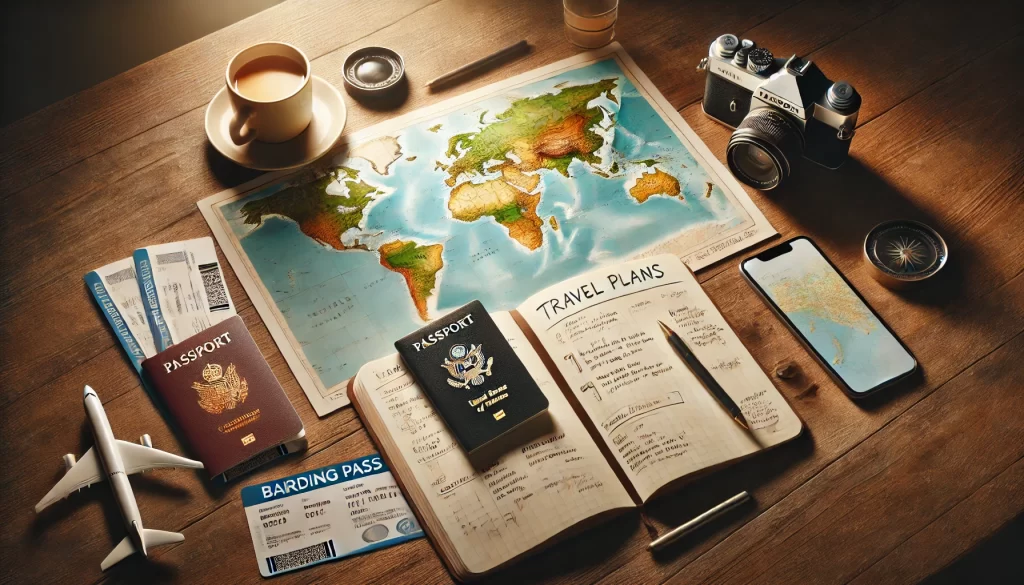Traveling is an exciting experience, but planning a trip can be overwhelming, especially for first-time travelers. From choosing a destination to booking flights and packing efficiently, there are many details to consider. This guide will help you plan your trip step by step, ensuring a smooth and enjoyable adventure.
1. Choose Your Destination
The first step in planning a trip is deciding where you want to go. Consider the following factors:
- Interests: Do you prefer a relaxing beach vacation, an adventurous hiking trip, or an immersive cultural experience?
- Budget: Some destinations are more affordable than others. Research costs for flights, accommodations, and activities.
- Weather: Check the best season to visit your chosen destination to avoid extreme weather conditions.
- Safety: Look up travel advisories and safety tips for your destination.
2. Set a Budget
Creating a budget helps you avoid overspending and ensures you have enough money for all aspects of your trip. Include:
- Flights and transportation
- Accommodation (hotels, hostels, Airbnb, etc.)
- Food and dining expenses
- Tours and activities
- Travel insurance
- Shopping and souvenirs
Using budgeting apps like Trail Wallet or TravelSpend can help track expenses.
3. Book Your Flights and Accommodation
Finding Cheap Flights
To get the best flight deals:
- Book in advance: The best time to book international flights is usually 2–3 months before departure.
- Use flight comparison websites: Websites like Skyscanner, Google Flights, and Kayak help find the best deals.
- Be flexible with dates: Flying on weekdays or during off-peak seasons can save you money.
- Consider alternative airports: Sometimes, flying into a nearby city and taking ground transportation is cheaper.
Choosing the Right Accommodation
Your choice of accommodation depends on your budget and travel style:
- Hotels: Ideal for comfort and convenience. Websites like Booking.com and Expedia offer great deals.
- Hostels: Budget-friendly and great for meeting fellow travelers. Check Hostelworld for reviews.
- Airbnb: Good for a local experience or long-term stays.
- Guesthouses and B&Bs: Offer a more personal touch and home-cooked meals.
4. Plan Your Itinerary
A well-planned itinerary helps you make the most of your trip. Consider the following:
- Major attractions: List must-visit places and book tickets in advance if necessary.
- Local experiences: Try authentic food, visit local markets, and explore hidden gems.
- Transportation: Research how to get around (public transport, car rentals, etc.).
- Downtime: Don’t overpack your schedule—allow time to relax and enjoy spontaneous experiences.
Apps like Google Maps and TripIt can help organize your plans.
5. Pack Smart
Packing efficiently ensures you have everything you need without carrying excess baggage. Follow these tips:
- Make a checklist: Essentials include clothing, toiletries, travel documents, and electronics.
- Pack light: Stick to versatile outfits that you can mix and match.
- Use packing cubes: These help organize your belongings and maximize space.
- Check airline baggage policies: Ensure your luggage meets size and weight requirements.
For international trips, don’t forget:
- Passport and visa
- Travel insurance details
- Power adapter (for different plug types)
- Medication and prescriptions
6. Stay Safe While Traveling
Safety is a top priority when traveling. Keep these tips in mind:
- Keep copies of important documents: Store digital and physical copies of your passport, visa, and travel insurance.
- Use secure payment methods: Avoid carrying too much cash; use credit cards or travel cards instead.
- Be aware of scams: Research common tourist scams in your destination.
- Stay connected: Get a local SIM card or an international data plan for internet access.
- Register with your embassy: Some governments offer traveler registration services for emergency assistance.
7. Get Travel Insurance
Many travelers overlook travel insurance, but it’s essential for unexpected situations like:
- Medical emergencies
- Trip cancellations
- Lost or stolen belongings
- Flight delays
Providers like World Nomads, Allianz Travel, and SafetyWing offer various coverage options.
8. Learn Basic Local Phrases
If you’re traveling to a country where you don’t speak the language, learning basic phrases can help:
- “Hello” and “Thank you”
- “Where is…?”
- “How much does it cost?”
- “I need help”
- “Do you speak English?”
Apps like Duolingo and Google Translate can assist with language learning.
9. Stay Flexible and Enjoy the Experience
No matter how well you plan, unexpected situations may arise. Be flexible and embrace the adventure!
- Have backup plans: If an attraction is closed, find an alternative activity.
- Be open to new experiences: Talk to locals, try new foods, and explore unplanned locations.
- Document your trip: Take photos, write a travel journal, or start a blog to share your experiences.
Final Thoughts
Planning a trip may seem overwhelming, but with the right preparation, it becomes an exciting and enjoyable process. From choosing a destination to packing smart and staying safe, each step plays a crucial role in making your journey stress-free and unforgettable.
Are you ready for your next adventure? Start planning today and make the most of your travel experience!

